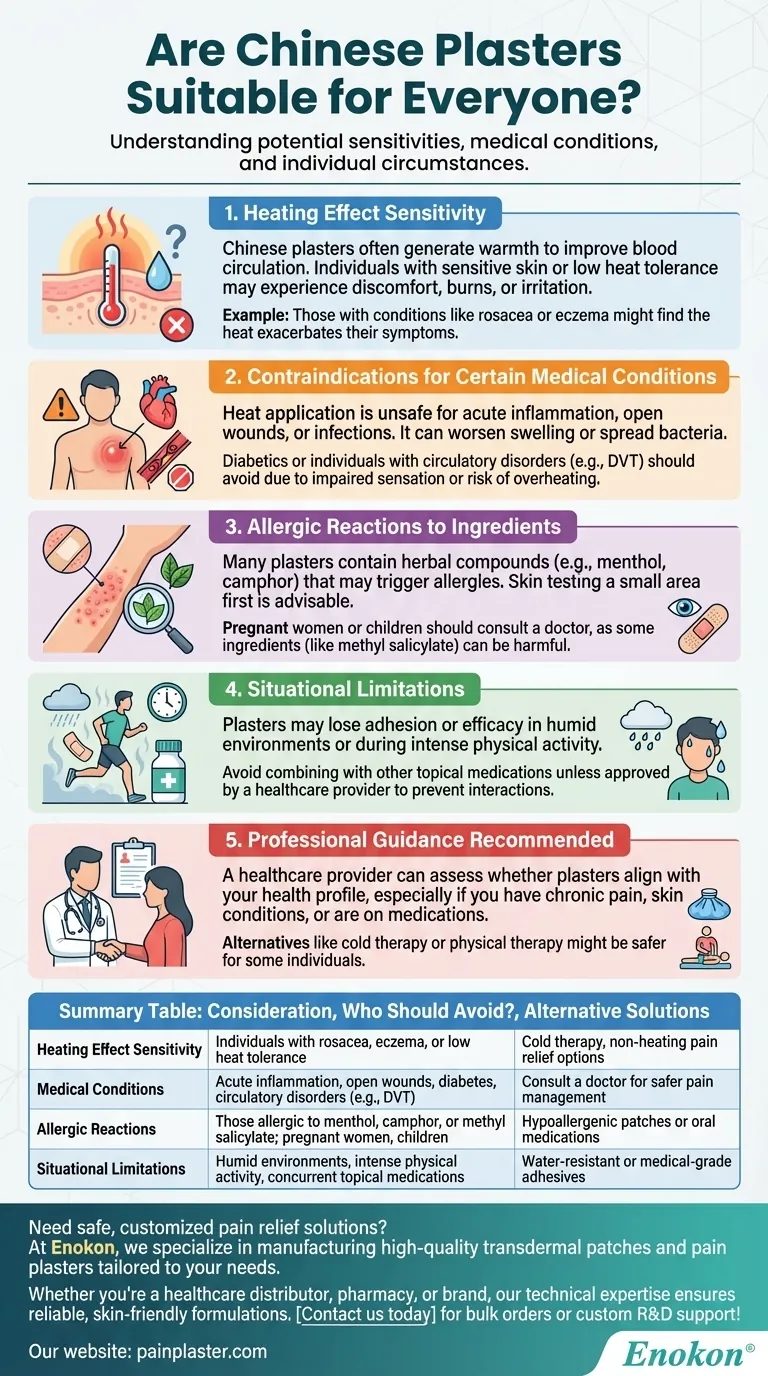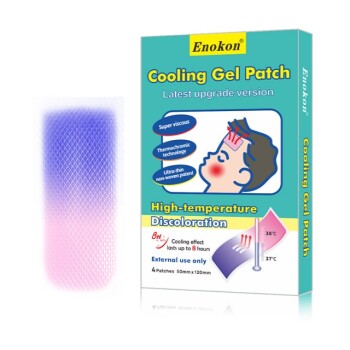Chinese plasters, while beneficial for many, are not universally suitable due to potential sensitivities, medical conditions, or specific individual circumstances. Their heating effects and ingredients may cause adverse reactions in some users, making professional consultation essential before application.

Key Points Explained:
-
Heating Effect Sensitivity
- Chinese plasters often generate warmth to improve blood circulation and relieve pain. However, individuals with sensitive skin or low heat tolerance may experience discomfort, burns, or irritation.
- Example: Those with conditions like rosacea or eczema might find the heat exacerbates their symptoms.
-
Contraindications for Certain Medical Conditions
- Heat application is unsafe for people with acute inflammation, open wounds, or infections, as it can worsen swelling or spread bacteria.
- Diabetics or individuals with circulatory disorders (e.g., deep vein thrombosis) should avoid plasters due to impaired sensation or risk of overheating.
-
Allergic Reactions to Ingredients
- Many plasters contain herbal compounds (e.g., menthol, camphor) that may trigger allergies. Skin testing a small area first is advisable.
- Pregnant women or children should consult a doctor, as some ingredients (like methyl salicylate) can be harmful if absorbed excessively.
-
Situational Limitations
- Plasters may lose adhesion or efficacy in humid environments or during intense physical activity.
- Avoid combining with other topical medications unless approved by a healthcare provider to prevent interactions.
-
Professional Guidance Recommended
- A healthcare provider can assess whether plasters align with your health profile, especially if you have chronic pain, skin conditions, or are on medications.
- Alternatives like cold therapy or physical therapy might be safer for some individuals.
Always prioritize personalized medical advice over self-diagnosis to ensure safe and effective use.
Summary Table:
| Consideration | Who Should Avoid? | Alternative Solutions |
|---|---|---|
| Heating Effect Sensitivity | Individuals with rosacea, eczema, or low heat tolerance | Cold therapy, non-heating pain relief options |
| Medical Conditions | Acute inflammation, open wounds, diabetes, circulatory disorders (e.g., DVT) | Consult a doctor for safer pain management |
| Allergic Reactions | Those allergic to menthol, camphor, or methyl salicylate; pregnant women, children | Hypoallergenic patches or oral medications |
| Situational Limitations | Humid environments, intense physical activity, concurrent topical medications | Water-resistant or medical-grade adhesives |
Need safe, customized pain relief solutions? At Enokon, we specialize in manufacturing high-quality transdermal patches and pain plasters tailored to your needs. Whether you're a healthcare distributor, pharmacy, or brand, our technical expertise ensures reliable, skin-friendly formulations. Contact us today for bulk orders or custom R&D support!
Visual Guide

Related Products
- Natural Herbal Wormwood Patch Pain Plaster
- Capsaicin Chili Medicated Pain Relief Patches
- Prostate Pain Kidney Health Care Patch for Men
- Far Infrared Heat Pain Relief Patches Transdermal Patches
- Hydra Gel Health Care Eye Patch
People Also Ask
- What technical advantages do Piroxicam Patches offer for Postherpetic Neuralgia? Discover Targeted Pain Relief Solutions
- What is the function of FT-NIR in transdermal patch analysis? Master API Stability and Kinetic Monitoring
- What immediate actions should be taken in case of a transdermal methylphenidate overdose? A Life-Saving Emergency Guide
- How do transdermal hormone patches work? Steady Hormone Delivery Through Skin Absorption
- What are the symptoms of nitroglycerin transdermal overdose? Recognize the Critical Signs for Emergency Action
- What should be done if a dose of topical diclofenac is missed? A Guide to Safe & Effective Pain Management
- What dietary considerations exist for fentanyl patch users? The Critical Grapefruit Interaction
- Why are replacement frequency and dosage specifications critical to transdermal patches? Master Delivery and Compliance

















